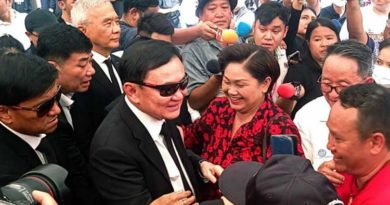ASEANEWS HEADLINES: ‘EXCLUSIVE: JBC set to convene after Sereno’s ouster’
 The Judicial and Bar Council (JBC) is set to convene to begin the process of replacing Maria Lourdes Sereno, who was ousted as chief justice by the Supreme Court last week.
The Judicial and Bar Council (JBC) is set to convene to begin the process of replacing Maria Lourdes Sereno, who was ousted as chief justice by the Supreme Court last week.This is to comply with the directive of the Supreme Court en banc to immediately open the application and nomination process for the position.
With a vote of 8 against 6, the high tribunal sacked Sereno, head of the judiciary, via quo warranto on Friday, voiding her appointment for her failure to submit a complete set of statements of assets, liabilities and net worth to the JBC when she applied for the post of chief justice in 2012.
The JBC is constitutionally mandated to screen and vet nominees for vacant posts in the judiciary and the offices of the Ombudsman and Deputy Ombudsman.
Retired Supreme Court Associate Justice Jose Catral Mendoza, a JBC member and chairman of the executive committee of the JBC, told The Manila Times the council would include in its agenda this week the nomination for the position of chief justice.
Mendoza however said the JBC would have to discuss if it would immediately open the nomination process or wait for a final ruling on the matter.
He pointed out that it was clear the SC ruling was “immediately executory,” although Sereno could still file a motion for reconsideration within a period of 15 days from notice.
With the ouster of Sereno, Senior Associate Justice Antonio Carpio will sit as acting chief justice and chairman of the JBC, being the most senior magistrate of the high court.
The May 11 ruling stated: “Accordingly, the position of Chief Justice of the Supreme Court is declared vacant and the Judicial and Bar Council is directed to commence the application and nomination process.”
“This Decision is immediately executory without need of further action from the Court,” said the ponencia or ruling written by Associate Justice Noel Tijam.
Other JBC members are Sen. Richard Gordon, Oriental Mindoro Rep. Reynaldo Umali and Justice Secretary Menardo Guevarra.
Mendoza is the head of the executive committee, lawyer Jose Mejia represents the academe, and Milagros Fernan-Cayosa represents the Integrated Bar of the Philippines. Retired judge Toribio Ilao represents the private sector.
The 1987 Constitution states that “A member of the Judiciary must be proven competence, integrity, probity and independence.”
On Friday, the high court ruled that Sereno lacked integrity for dishonesty over her SALNs.
It was found that Sereno filed only 11 SALNs over her 20-year career in government as a law professor at the University of the Philippines and government counsel for an international arbitration case.
Sereno however said she should be subjected to impeachment proceedings and not quo warranto, as she was an impeachable officer.
The court ordered Sereno to show cause within 10 days why she should not be sanctioned for violating the Code of Professional Responsibility and the Code of Judicial Conduct “for transgressing the sub judice (gag) rule and for casting aspersions and ill motives to the Members of the Supreme Court.”
The eight justices who ousted Sereno were Tijam and Associate Justices Teresita Leonardo-de Castro, Diosdado Peralta, Lucas Bersamin, Francis Jardeleza, Samuel Martires, Andres Reyes and Alexander Gesmundo.
The dissenters were Associate Justices Antonio Carpio, Presbitero Velasco Jr., Mariano Del Castillo, Marvic Leonen, Estela Perlas-Bernabe, and Alfredo Benjamin Caguioa. /BY JOMAR CANLAS, TMT ON
.
ASEANEWS HEADLINES










All photographs, news, editorials, opinions, information, data, others have been taken from the Internet ..aseanews.net | [email protected] / For comments, Email to : Aseanews.Net | [email protected] | Contributor:-









